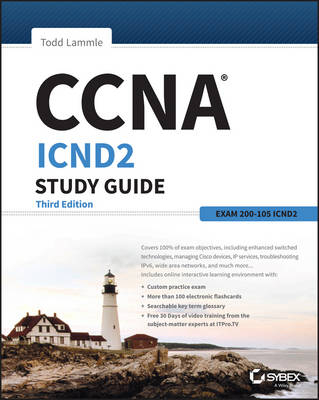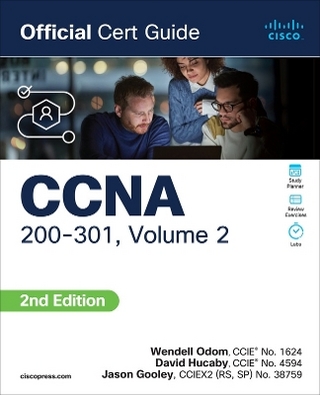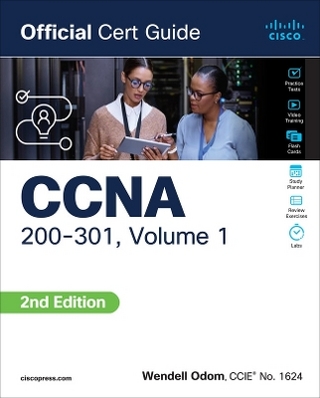
CCNA ICND2 Study Guide
John Wiley & Sons Inc (Verlag)
978-1-119-29098-8 (ISBN)
- Titel ist leider vergriffen;
keine Neuauflage - Artikel merken
Real-world expert preparation for the ICND2, with hands-on labs The CCNA ICND2 Study Guide, 3rd Edition covers 100 percent of all exam 200-105 objectives. Leading networking authority Todd Lammle provides detailed explanations and clear instruction on IP data networks, switching and routing technologies, IPv4 and IPV6 addressing, troubleshooting, security, and more. Dozens of hands-on labs help you gain experience with important tasks, and expert examples and insights drawn from thirty years of networking bring real-world perspective to essential CCNA skills. The Sybex interactive online learning environment provides hundreds of sample questions, a glossary of key terms, and over 100 electronic flashcards to streamline your study time and expand your resources; the pre-assessment test shows you where to focus your efforts, and the practice exam allows you test your level of understanding while there's still time to improve. Need more study tools? Exclusive to this edition, you will receive 30 days of free online video training with almost 20 hours of Routing and Switching from the experts at ITPro TV. The ICND2 is the final exam for the CCNA certification.
With 80 percent of the Internet's routers being Cisco technology, this exam is critical for a career in networking. This guide explains everything you need to be confident on exam day. * Study 100% of the exam objectives * Get essential hands-on experience * Access sample questions and flashcards * Test your knowledge with a bonus practice exam Be fully prepared for the CCNA ICND2 with the Sybex advantage.
Todd Lammle, Cisco certified in almost every category, is the authority on Cisco networking and certification. His three decades of real-world experience is prevalent in his writing. He is an experienced networking engineer with very practical experience working on the largest bounded and unbounded networks in the world at such companies as Xerox, Hughes Aircraft, Texaco, AAA, Cisco, and Toshiba, among many others. Todd has published over 60 books, including the very popular and bestselling CCNA: Cisco Certified Network Associate Study Guide and Cisco Firepower NGIPS. Todd runs an international training company from Texas, and a large scale consulting business out of Colorado. You can reach Todd through his forum and blog at www.lammle.com/ccna.
Introduction xvii Assessment Test xxxi Chapter 1 Enhanced Switched Technologies 1 VLAN Review 2 Assigning Switch Ports to VLANs 5 Configuring Trunk Ports 7 VLAN Trunking Protocol (VTP) 11 VTP Modes of Operation 12 VTP Pruning 14 Configuring VTP 15 Troubleshooting VTP 16 Spanning Tree Protocol (STP) 20 Spanning-Tree Terms 21 Spanning-Tree Operations 25 Types of Spanning-tree Protocols 28 Common Spanning Tree 28 Per-VLAN Spanning Tree+ 29 Modifying and Verifying the Bridge ID 36 Spanning-Tree Failure Consequences 41 PortFast and BPDU Guard 43 BPDU Guard 45 EtherChannel 47 Configuring and Verifying Port Channels 48 Summary 52 Exam Essentials 53 Written Lab 1 53 Hands-on Labs 54 Hands-on Lab 1.1: Verifying STP and Finding Your Root Bridge 55 Hands-on Lab 1.2: Configuring and Verifying Your Root Bridge 56 Hands-on Lab 1.3: Configuring PortFast and BPDU Guard 58 Hands-on Lab 1.4: Configuring and Verifying EtherChannel 59 Review Questions 61 Chapter 2 Network Device Management and Security 67 Mitigating Threats at the Access Layer 68 External Authentication Options 71 RADIUS 71 TACACS+ 72 SNMP 73 Management Information Base (MIB) 74 Configuring SNMP 75 Client Redundancy Issues 77 Introducing First Hop Redundancy Protocols (FHRPs) 79 Hot Standby Router Protocol (HSRP) 80 Virtual MAC Address 82 HSRP Timers 83 Group Roles 85 Configuring and Verifying HSRP 87 Summary 93 Exam Essentials 93 Written Lab 2 94 Review Questions 95 Chapter 3 Enhanced IGRP 99 EIGRP Features and Operations 100 Neighbor Discovery 101 Reliable Transport Protocol (RTP) 106 Diffusing Update Algorithm (DUAL) 107 Route Discovery and Maintenance 107 Configuring EIGRP 108 VLSM Support and Summarization 111 Controlling EIGRP Traffic 114 Split Horizon 125 Verifying and Troubleshooting EIGRP 127 Troubleshooting Example with EIGRP 133 Simple Troubleshooting EIGRP for the CCNA 143 EIGRPv6 145 Summary 150 Exam Essentials 151 Written Lab 3 151 Hands-on Labs 152 Hands-on Lab 3.1: Configuring and Verifying EIGRP 152 Hands-on Lab 3.2: Configuring and Verifying EIGRPv6 153 Review Questions 155 Chapter 4 Open Shortest Path First (OSPF) 163 Open Shortest Path First (OSPF) Basics 164 OSPF Terminology 167 OSPF Operation 169 Configuring OSPF 171 Enabling OSPF 171 Configuring OSPF Areas 172 Configuring Our Network with OSPF 175 OSPF and Loopback Interfaces 180 Configuring Loopback Interfaces 181 Verifying OSPF Configuration 183 The show ip ospf Command 184 The show ip ospf database Command 185 The show ip ospf interface Command 186 The show ip ospf neighbor Command 187 The show ip protocols Command 188 Summary 189 Exam Essentials 189 Written Lab 4 190 Hands-on Labs 190 Hands-on Lab 4.1: Enabling the OSPF Process 191 Hands-on Lab 4.2: Configuring OSPF Interfaces 192 Hands-on Lab 4.3: Verifying OSPF Operation 193 Review Questions 194 Chapter 5 Multi-Area OSPF 201 OSPF Scalability 202 Categories of Multi-area Components 204 Adjacency Requirements 204 OSPF Router Roles 205 Link-State Advertisements 206 OSPF Hello Protocol 208 Neighbor States 209 Basic Multi-area Configuration 211 Verifying and Troubleshooting Multi-area OSPF Networks 214 The show ip ospf Command 215 The show ip ospf interface Command 216 The show ip protocols Command 219 The show ip route Command 219 The show ip ospf database Command 220 Troubleshooting OSPF Scenario 222 Simple Troubleshooting OSPF for the CCNA 230 OSPFv3 232 Verifying OSPFv3 234 Summary 237 Exam Essentials 237 Written Lab 5 238 Hands-on Labs 238 Hands-on Lab 5.1: Configuring and Verifying OSPF Multi-Area 239 Hands-on Lab 5.2: Configuring and Verifying OSPFv3 242 Review Questions 244 Chapter 6 Troubleshooting IP, IPv6, and VLANs 249 Troubleshooting IP Network Connectivity 250 Using IP SLA for Troubleshooting 261 Using SPAN for Troubleshooting 263 Configuring and Verifying Extended Access Lists 265 Troubleshooting IPv6 Network Connectivity 268 ICMPv6 268 Troubleshooting IPv6 Extended Access Lists 276 Troubleshooting VLAN Connectivity 280 VLAN Troubleshooting 280 Trunk Troubleshooting 285 Summary 292 Exam Essentials 293 Written Lab 6 293 Review Questions 295 Chapter 7 Wide Area Networks 299 Introduction to Wide Area Networks 300 WAN Topology Options 301 Defining WAN Terms 303 WAN Connection Bandwidth 304 WAN Connection Types 305 WAN Support 306 Cisco Intelligent WAN (IWAN) 309 Cabling the Serial Wide Area Network 312 Serial Transmission 312 Data Terminal Equipment and Data Communication Equipment 313 High-Level Data-Link Control (HDLC) Protocol 314 Point-to-Point Protocol (PPP) 316 Link Control Protocol (LCP) Configuration Options 317 PPP Session Establishment 318 PPP Authentication Methods 319 Configuring PPP on Cisco Routers 319 Configuring PPP Authentication 319 Verifying and Troubleshooting Serial Links 320 Multilink PPP (MLP) 325 PPP Client (PPPoE) 329 Configuring a PPPoE Client 330 Virtual Private Networks 331 Benefits of VPNs 332 Enterprise- and Provider-Managed VPNs 333 Introduction to Cisco IOS IPsec 335 IPsec Transforms 336 GRE Tunnels 337 GRE over IPsec 338 Configuring GRE Tunnels 339 Verifying GRP Tunnels 341 Single-Homed EBGP 343 Protocol Comparison and Overview 344 Configuring and Verifying EBGP 347 Verifying EBGP 349 Summary 352 Exam Essentials 352 Written Lab 7 353 Hands-on Labs 353 Hands-on Lab 7.1: Configuring PPP Encapsulation and Authentication 354 Hands-on Lab 7.2: Configuring and Monitoring HDLC 355 Hands-on Lab 7.3: Configuring a GRE Tunnel 356 Review Questions 359 Chapter 8 Evolution of Intelligent Networks 365 Switch Stacking 366 Cloud Computing and Its Effect on the Enterprise Network 368 Service Models 370 Overview of Network Programmability in Enterprise Network 371 Application Programming Interfaces (APIs) 372 Southbound APIs 373 Northbound APIs 374 Cisco APIC-EM 375 Using APIC-EM for Path Tracing 377 Cisco Intelligent WAN 378 Quality of Service 380 Traffic Characteristics 380 Trust Boundary 382 QoS Mechanisms 383 Classification and Marking 383 Policing, Shaping, and Re-Marking 384 Tools for Managing Congestion 385 Tools for Congestion Avoidance 388 Summary 389 Exam Essentials 389 Written Lab 8 389 Review Questions 391 Appendix A Answers to Written Labs 395 Chapter 1: Enhanced Switched Technologies 396 Written Lab 1 396 Chapter 2: Network Device Management and Security 396 Written Lab 2 396 Chapter 3: Enhanced IGRP 397 Written Lab 3 397 Chapter 4: Open Shortest Path First (OSPF) 397 Written Lab 4 397 Chapter 5: Multi-Area OSPF 398 Written Lab 5 398 Chapter 6: Troubleshooting IP, IPv6, and VLANs 398 Written Lab 6 398 Chapter 7: Wide Area Networks 399 Written Lab 7 399 Chapter 8: Evolution of Intelligent Networks 399 Written Lab 8 399 Appendix B Answers to Review Questions 401 Chapter 1: Enhanced Switched Technologies 402 Chapter 2: Network Device Management and Security 404 Chapter 3: Enhanced IGRP 405 Chapter 4: Open Shortest Path First (OSPF) 407 Chapter 5: Multi-Area OSPF 409 Chapter 6: Troubleshooting IP, IPv6, and VLANs 410 Chapter 7: Wide Area Networks 411 Chapter 8: Evolution of Intelligent Networks 413 Index 415
| Erscheinungsdatum | 30.10.2016 |
|---|---|
| Verlagsort | New York |
| Sprache | englisch |
| Maße | 188 x 232 mm |
| Gewicht | 836 g |
| Themenwelt | Mathematik / Informatik ► Informatik ► Netzwerke |
| Informatik ► Weitere Themen ► Zertifizierung | |
| Sozialwissenschaften ► Pädagogik | |
| ISBN-10 | 1-119-29098-8 / 1119290988 |
| ISBN-13 | 978-1-119-29098-8 / 9781119290988 |
| Zustand | Neuware |
| Haben Sie eine Frage zum Produkt? |
aus dem Bereich


